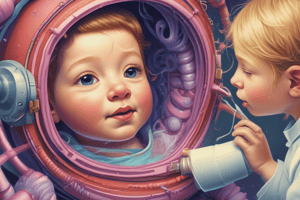Podcast
Questions and Answers
What is an inguinal hernia and who does it commonly affect?
What is an inguinal hernia and who does it commonly affect?
An inguinal hernia is due to a patent processus vaginalis, which is a peritoneal pouch extending between the peritoneal cavity and the inguinal canal. It is more frequent in boys than in girls, with a ratio of 9:1, and it is more common in premature babies.
What is intussusception and what are its characteristics?
What is intussusception and what are its characteristics?
Intussusception is a condition where a segment of the intestine invaginates into an adjacent segment. It is a common cause of intestinal obstruction during the first year of life and is characterized by intermittent colicky abdominal pain and vomiting with currant jelly stool.
What are the common presentations and complications of an inguinal hernia?
What are the common presentations and complications of an inguinal hernia?
An inguinal hernia is commonly presented with swelling increased with crying and vomiting. Complications include obstruction and strangulation.
How is intussusception diagnosed and what are the consequences of delayed management?
How is intussusception diagnosed and what are the consequences of delayed management?
In which gender is inguinal hernia more frequent?
In which gender is inguinal hernia more frequent?
What is Hirschsprung's disease and what characterizes this condition?
What is Hirschsprung's disease and what characterizes this condition?
What is the most common side for inguinal hernia presentation?
What is the most common side for inguinal hernia presentation?
What is the recommended treatment for inguinal hernia after diagnosis?
What is the recommended treatment for inguinal hernia after diagnosis?
What are the presenting symptoms of intussusception?
What are the presenting symptoms of intussusception?
How is Hirschsprung's disease characterized?
How is Hirschsprung's disease characterized?
What is the most common side for inguinal hernia presentation?
What is the most common side for inguinal hernia presentation?
What is the recommended treatment for inguinal hernia after diagnosis?
What is the recommended treatment for inguinal hernia after diagnosis?
What are the presenting symptoms of intussusception?
What are the presenting symptoms of intussusception?
What is Hirschsprung's disease characterized by?
What is Hirschsprung's disease characterized by?
What is a common cause of intestinal obstruction during the first year of life?
What is a common cause of intestinal obstruction during the first year of life?
Flashcards are hidden until you start studying
Study Notes
Inguinal Hernia
- An inguinal hernia occurs when tissue protrudes through a weak spot in the abdominal muscles, typically in the groin area.
- More common in males due to anatomical differences, but can affect females.
- Most frequent in infants and older adults.
- Commonly presents on the right side of the groin.
- Symptoms include a visible bulge, discomfort, and pain when bending or lifting.
Complications of Inguinal Hernia
- Can lead to incarceration, where the hernia becomes trapped and cannot be pushed back.
- Risk of strangulation, compromising blood supply to the trapped tissue, leading to potential necrosis.
- Symptoms may include severe pain, nausea, and vomiting.
Intussusception
- Occurs when a part of the intestine folds into itself, like a telescope, causing obstruction and impaired blood supply.
- Most common cause of intestinal obstruction in children under two years of age.
- Symptoms include abdominal pain, "currant jelly" stools, vomiting, and a palpable abdominal mass.
Diagnosis and Management of Intussusception
- Diagnosed through imaging techniques like ultrasound or CT scan.
- Delayed management can lead to serious complications such as intestinal necrosis and perforation.
Hirschsprung's Disease
- A congenital condition characterized by the absence of ganglion cells in a segment of the bowel, leading to severe constipation or intestinal obstruction.
- Symptoms include failure to pass meconium in the newborn period, abdominal distension, and vomiting.
Treatment of Inguinal Hernia
- Surgical repair is the recommended treatment following diagnosis.
- Techniques can include open repair or laparoscopic surgery, depending on the case's severity and patient health.
Summary of Key Points
- Inguinal hernias commonly affect males and present most frequently on the right side.
- Intussusception is a major cause of intestinal obstruction in infants.
- Hirschsprung's disease results in functional obstruction due to lack of nerve cells in the colon.
- Delayed diagnosis and treatment of both conditions can lead to severe complications.
Studying That Suits You
Use AI to generate personalized quizzes and flashcards to suit your learning preferences.




